
This book offers principles that if followed, would raise your effectiveness as a leader many bars higher.
1.Effectiveness Can Be Learnt
- Being effective does not require special abilities, special talent or training.
- It can be practised till it becomes a habit.
5 habits of the mind have to be acquired to be an effective executive:
- Effective executives understand where their time passes: They operate systematically at handling the limited time that can be taken under their control.
- Effective executives focus on contribution: They organise their efforts to results rather than to work. They evaluate their responsibility based on the expected results. Not by the work that needs to be done.
- Effective executives grow on strengths: They always develop on their own strengths, the strengths of their superiors, co-workers and assistants. They never build on weakness. They don’t begin with things they can’t do.
- Focus on major areas where higher performance will produce extraordinary results: They set priorities and stay with those decisions.
- Effective executives make effective decisions: This surpasses all, a body of systems. The proper steps in the proper sequence.
2. Know Your Time:
- The three-step system is the basis of executive effectiveness: recording time, managing time and consolidating time.
- Effective executives aim to find out what wastes their time without adding to their effectiveness.
- Unlike other resources, executive effectives know that one cannot rent, hire, buy, or obtain more time.
- They manage their time by curtailing unproductive demands on their time.
3.What can I contribute?
- The effective executive always focuses on his due contribution. He looks for ways where his contribution will significantly affect the performance and the results of the organisation.
- Executives focus downwards. They are involved with efforts instead of results.
- Organizations need performance in 3 areas- Direct results, to build values and reaffirmation of them, and to build and develop people for tomorrow.
4.Making strength productive
- An effective executive knows that he cannot build on weakness.
- Achieving results is about using all the available strengths. Strengths of partners, strengths of the superior, and one’s own strengths.
- Such executives don’t make staffing arrangements based on reducing weakness but to maximise strength.
5.Effective Decisions
- Effective executives know that people don’t start with facts. They start with opinions.
- They insist people voicing an opinion also take responsibility for determining what factual evidence can be anticipated and should be looked for.
- They insist on disagreement and do not make a decision if there isn’t any.
- They use opposition of opinion as a means to make sure all essential aspects of an important subject are looked at carefully.
# Key Takeaways:
– The role of a manager is to achieve results through others, not just by their own efforts.
– Effective managers prioritize and delegate tasks, communicate clearly, and provide feedback to their team.
– Building strong relationships with team members is crucial for effective management.
– Effective managers continuously learn and adapt to changing situations.
# Practical Application:
The concepts and strategies outlined in The Effective Manager can be practically applied in real-world scenarios by:
– Prioritizing tasks and delegating them to team members based on their strengths and skills.
– Communicating clearly and regularly with team members to ensure everyone is on the same page.
– Providing constructive feedback to team members to help them improve and grow.
– Building strong relationships with team members by showing genuine interest and support.
– Continuously learning and adapting to changing situations to stay effective as a manager.
# Valuable Insights:
– Chapter 1: “The Role of the Manager”
– provides a clear understanding of the responsibilities and expectations of a manager.
– Chapter 3: “Prioritizing and Delegating”
– offers practical tips on how to effectively prioritize and delegate tasks.
– Chapter 5: “Building Relationships”
– emphasizes the importance of building strong relationships with team members and provides strategies for doing so.
– Chapter 7: “Continuous Learning”
– highlights the importance of continuous learning and provides ways to stay updated and adapt to changing situations.
# Case Studies and Examples:
– The case study of a manager who successfully turned around a struggling team by building strong relationships and providing clear communication.
– The example of a manager who effectively prioritized and delegated tasks to achieve a successful project outcome.
– The story of a manager who continuously learned and adapted to changing situations, leading to the growth and success of their team.
Leave a Reply